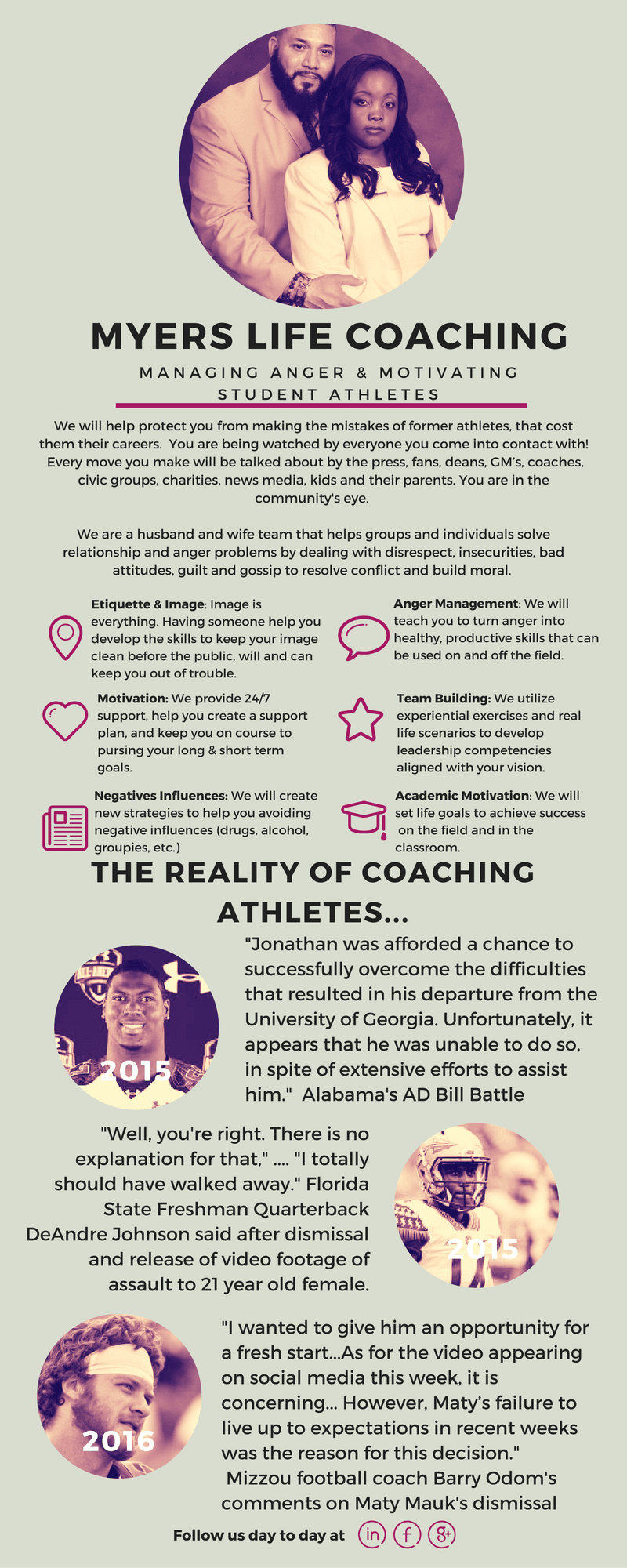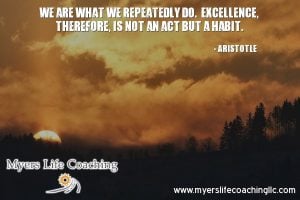A college football team has on average 12 coaches. The NCAA spells out how many coaches and what types of coaches a football team may employ. Now of those 12 National collegiate coaches, none of them have devoted their careers to specialize professionally in psycho-education, organizational development, and ministry. Many coaches believe that their recruitment efforts will eliminate any and all Student athlete problems. However, life happens, people get angry, and anger is a big part of American Sports. Myers life coaching will help you build character and positive behaviors. We offer one-on-one life coaching and in team sessions. We have utilized our curriculum developed for court system to help your athletes uncover their strengths, improve weakness and handle adverse situations.
Do athletes make better students?
Being a student athlete is difficult. These athletes are thrown into new living routines that involve cooking, cleaning, managing money and caring for self while taking on a full course load. The life of a student athlete includes training, travel, spending countless hours with coaches, trainers, and physical therapists. Not to mention seeing the physical therapist for pre-training treatment, watching recordings of games and practices, warming up for practice, cooling down after practice, traveling back from the field, individual meetings with the coaches, or team organized meetings, all of which are frequent during the season. Many full-time students have part-time jobs that pay student athletes, but those jobs are usually 20-30 hours a week. Most importantly, the major student athlete problem is balancing all of this with their social lives. From a development perspective, socialization is important during this stage of life.
Avoiding negative influences (drugs, alcohol, groupies, etc.) is a challenge for any young adult. This is one area that young professional athletes get themselves into trouble. Did you know that the value of the athletes stock goes down with every unacceptable incident? The student athlete becomes a liability to yourself, owners, coaches and teammates. Managing anger in relationships is essential.
Uncontrolled anger can result in a public relations nightmare…
Sometimes anger can affect what you say or do before you even recognize the feeling. This is especially true if you feel angry all the time. Being a college athlete may cause you to become so used to the feeling of anger that you don’t notice it. Sort of like how you can hear the sound of a refrigerator but block it from your mind.
Your feelings influence how you behave. We almost always feel something else first before we get angry. We might first feel embarrassed, attacked, offended, disrespected, forced, trapped, or pressured. If any of these feelings are intense enough, we think of the emotion as anger. You can change the way you are feeling by changing your thoughts. Try to experience being angry without angry thoughts. Thinking influences our feelings through the things that we say to ourselves. Unhelpful thoughts can add fuel to the fire and play a large role in keeping anger going after the event has passed.
What do you do? What do you sacrifice? How do you manage your time? The answer is that if you are not 100% on top of every one of your assignments, if you are not in constant contact with your coaches, if you are not willing to do what regular students do but in harsher environments, you will not succeed. Of course, if you don’t succeed, and you do poorly in school your eligibility or scholarship can be taken, your place on the squad is jeopardized, and before you know it you’re off the team and out of school. The pressure is something that only a student athlete could ever know. This is the definition of a student athlete.
Your body goes into fight flight mode. This means that your adrenaline may increase. In addition your testosterone levels increase and the stress chemical cortisol actually DECREASES during early anger. Intense anger damages the arteries while long term anger increases the stress chemical cortisol. If we keep dosing our brains and bodies with cortisol it can cause aging and structural changes in the brain. Our program provides 24/7 support to help you deal with anger.
Have you heard the saying that 90% of athletics is mental and 10% is physical?
Three critical items that will spiral a student athlete out of control are:
1- Destructive self talk (dis-empowering inner coaching)
2- Focus of concentration on what’s wrong or not working
3- Focusing on what they can’t control, i.e. the other team/players, the weather
Guaranteed that by paying attention to these three things a student athlete will not have a stellar game. Dealing with anger and overcoming negative thinking is the glue that takes your team to the next level.
Anger management coaching will teach your student athletes to turn anger into healthy productive skills such as…
- Anger Identification/Triggers
- Assertiveness
- Communication and Listening • Problem-solving
- Conflict resolution
- Forgiveness
- Expectation Management
- Relaxation Techniques
- Empathy
- Emotional Intelligence
- Impulse Control
- Improved Self-talk and Optimistic Thinking
Dr. Myers has a background in industrial organization psychology, clinical mental health counseling, and political science. Here husband and partner has an extensive history in motivational speaking and ministry. They provide a unique combination of experience and expertise that will take your team to the next level.
- Anger Management. Learn what causes anger. Developing the teams anger management skills will help you develop the coping skills necessary to get through the tough times. Sometimes frustration can build between coaches and athletes. Being aware of your own communication and motivation styles as a coach and the communication and motivation styles of your student athletes can improve this situation. Anger management techniques will promote better relationships between coaches and student athletes.
- Institutional Integrity. You are in the public eye. Failures in the areas of rules compliance, academic integrity, inappropriate coach or student-athlete behavior can discredit the department and impact funding.
- Management Training. Outstanding athletics directors may lack the time and/or expertise to address the increased complexities of athletic program management or want help in setting up model programs addressing topics such as anger management, etiquette, or various other life skills.
- Leadership Competency Development: One-on-one interaction with an objective third party to support the athletic director or coaching staff to sharpen the skills of an individual who has been identified as a top performer is essential. Activities will be introspective and will enable team members to share with others at a very deep level. Self-awareness is essential to change.



